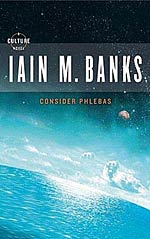
![]() Mattastrophic
Mattastrophic
10/10/2011
![]()
I liked a lot about this novel, but there were parts of its narrative structure that kept me from rating it higher than a 7. The universe Banks constructs not only feels huge but varied, with lots of interesting locals (like a ringworld on the eve of its destruction and a planet of the dead). Banks certainly got me to believe that this was a well-populated and belivable universe. The description in the novel is very well done too, creating a narrative voice that is quite pleasing. It is about a galactic war between two superpowers, but it breaks the standard space opera format of its time by casting a small cog in the war machine as the protagonist instead of the lantern jawed hero who will turn the tide of the entire conflict. The protagonist, Horza, is interesting in that we learn about the war through his very biased viewpoint. His interactions with other characters usually feels believable and a few become pretty interesting. The technology and science in the book holds up pretty well; if i weren't told I might think it was written in the past 10 years or so and not over two decades ago.
HOWEVER, the book often feels like a series of crazy, over-the-top episodes cobbled together into a novel, so the overall crisis of the novel doesn't always feel like the driving force of the narrative. Also, towars the end the viewpoint shifts a lot in an effort to create a tense, action-packed climax that just irritated and annoyed me. It was a dizzying ride, particularly towards the end, but filled with enough intersting images, concepts, and scenery to keep me interested in picking up the second Culture novel. Aesthetically pleasing but narratively scattered, Consider Phlebas might not rock your world but it is suitably diverting if you go into it expecting some of its flaws.
http://www.strangetelemetry.wordpress.com